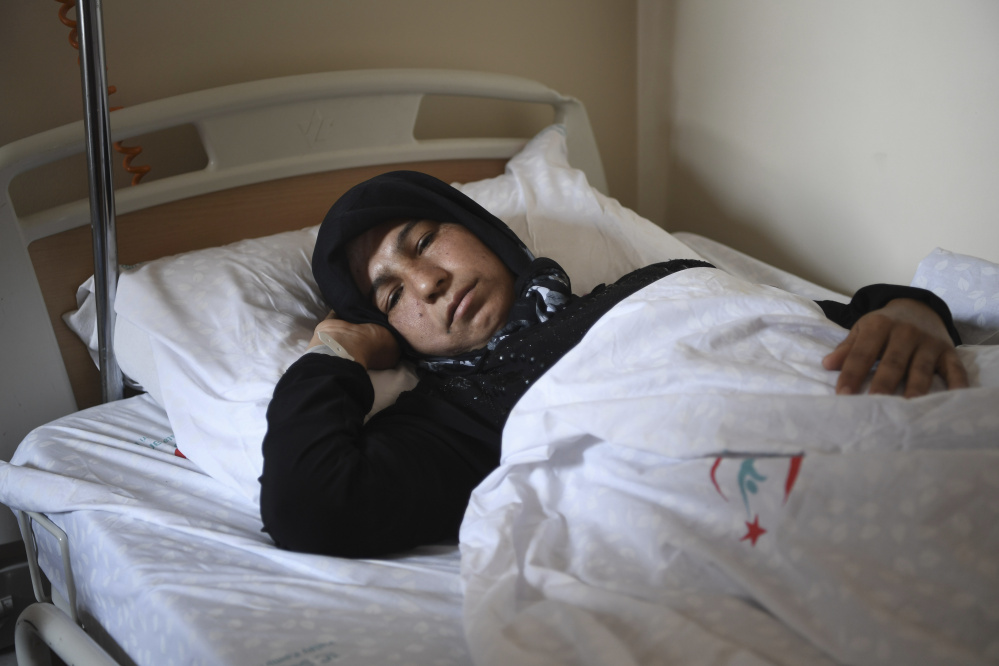BEIRUT — Residents of the Syrian town devastated by a chemical weapons attack said warplanes returned to bomb them Saturday, despite a U.S. missile barrage and warnings of possible further response.
At least 86 people in the northwestern town of Khan Sheikhoun were killed Tuesday in a chemical attack that left hundreds choking or foaming at the mouth. Eyewitnesses and a monitoring group, the Syrian Observatory for Human Rights, said Saturday that fresh attacks on the town had killed one woman and wounded several others.
Residents cowered in bedrooms and basements Saturday, underscoring the apparently unchanged threat they faced from the Syrian government’s arsenal of rockets, barrel bombs and other weapons that have caused most of the conflict’s 500,000 dead.
In retaliation for Tuesday’s chemical assault, President Trump ordered missile strikes on a Syrian airfield housing a jet fleet responsible for extensive bombing across northern Syria.
The missile barrage was the first direct military action the United States has taken against Syrian President Bashar Assad’s government in the six-year-long conflict. Although Trump warned of possible further intervention, the Pentagon has said no other strikes against government targets are in current plans.
American officials predicted that the strikes would result in a major shift of Assad’s calculus, but they appeared to be symbolic in practice. Within 24 hours of the attack, monitoring groups reported that jets were taking off from the bombed Shayrat air base once again, this time to bomb Islamic State positions.
There were also reports of Syrian government and Russian airstrikes across the provinces of Damascus, Aleppo, Idlib and Daraa, all killing civilians. However, there were no reports of further use of chemical weapons.
“The American strikes did nothing for us. They can still commit massacres at any time,” said Majed Khattab, speaking by phone from Khan Sheikhoun. “No one here can sleep properly, people are really afraid.”
Turkish Foreign Minister Mevlut Cavusoglu described Trump’s decision to retaliate as welcome, but not enough.
“If this intervention is limited only to an air base, if it does not continue and if we don’t remove the regime from heading Syria, then this would remain a cosmetic intervention,” he said.
A longtime backer of Syria’s armed opposition, Turkey is now overseeing a stuttering peace process in the Kazakh capital, Astana, that it hopes will hasten an end to the war.
Elsewhere in the region, a leading Iraqi Shiite cleric and militia leader, Moqtada al-Sadr, called on Assad to step down and “save Syria before it’s too late.”
“President Bashar al-Assad should resign and leave power for the love of Syria, allowing the dear people of Syria to avoid war and the scourge of terrorism,” he said.
Although some of Iraq’s Shiite militias that are more directly linked to Iran have fought in support of Assad in Syria, Sadr’s Peace Brigades have not, and the cleric promotes himself as a nationalist.
In his statement, he also criticized U.S. and Russian intervention in the country.
“I call for a military retreat from Syria by everyone,” he said. “They are the only ones who have the right to decide their fate.”
In a sign of the continuing diplomatic fallout from the chemical attack and the U.S. response, British Foreign Secretary Boris Johnson announced Saturday that he had canceled a planned visit to Moscow on Monday.
Send questions/comments to the editors.



Comments are no longer available on this story